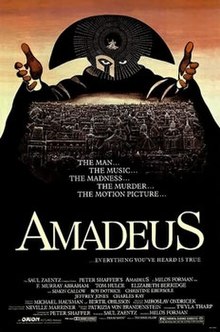Amadeus (film)
| Amadeus | |
|---|---|

Theatrical release poster by Peter Sís
|
|
| Directed by | Miloš Forman |
| Produced by | Saul Zaentz |
| Screenplay by | Peter Shaffer |
| Based on |
Amadeus by Peter Shaffer |
| Starring | |
| Cinematography | Miroslav Ondříček |
| Edited by |
|
|
Production
company |
|
| Distributed by | Orion Pictures |
|
Release date
|
|
|
Running time
|
161 minutes |
| Country | United States |
| Language | English |
| Budget | $18 million |
| Box office | $52 million (North America) |
Amadeus is a 1984 American period drama film directed by Miloš Forman, adapted by Peter Shaffer from his stage play Amadeus. The story, set in Vienna, Austria, during the latter half of the 18th century, is a fictionalized biography of Wolfgang Amadeus Mozart. Mozart's music is heard extensively in the soundtrack of the movie. Its central thesis is that Antonio Salieri, an Italian contemporary of Mozart is so driven by jealousy of the latter and his success as a composer that he plans to kill him and to pass off a Requiem, which he secretly commissioned from Mozart as his own, to be premiered at Mozart's funeral. Historically, the Requiem, which was never finished, was commissioned by Count von Walsegg, and Salieri, far from being jealous of Mozart, was on good terms with him and even tutored his son after Mozart's death.
The film was nominated for 53 awards and received 40, which included eight Academy Awards (including Best Picture), four BAFTA Awards, four Golden Globes, and a Directors Guild of America (DGA) award. As of 2016, it is the most recent film to have more than one nomination in the Academy Award for Best Actor category. In 1998, the American Film Institute ranked Amadeus 53rd on its 100 Years... 100 Movies list.
The story begins in 1823 as the elderly Antonio Salieri (F. Murray Abraham) attempts suicide by slitting his throat while loudly begging forgiveness for having killed Wolfgang Amadeus Mozart (Tom Hulce) in 1791. Placed in a lunatic asylum for the act, Salieri is visited by Father Vogler (Richard Frank), a young priest who seeks to hear his confession. Salieri is initially sullen and uninterested, but eventually warms to the priest and launches into a long "confession" about his relationship with Mozart.
...
Wikipedia
